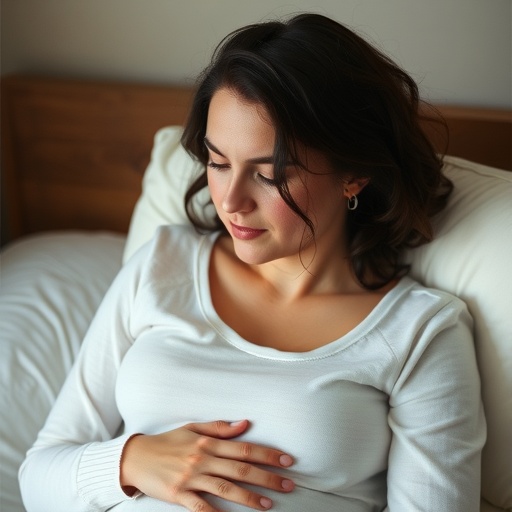In groundbreaking new research published in BMC Psychiatry, scientists have unveiled a complex psychological interplay affecting women who have undergone frozen-thawed embryo transfer (FET) after experiencing early pregnancy loss (EPL). The study delves into how alexithymia—a condition marked by the inability to identify and describe emotions—relates to post-traumatic stress disorder (PTSD) in this vulnerable population, shedding light on the pivotal role of intolerance of uncertainty (IU) as a mediating factor.
This investigation emerges against a backdrop of rising interest in the psychological aftermath of fertility treatments, especially in women who face the added trauma of EPL. The emotional toll of repeated pregnancy attempts combined with repeated loss has been notoriously difficult to measure and treat. However, this latest cross-sectional study, conducted in Zhejiang Province, Mainland China, between June 2024 and January 2025, uses advanced psychometric tools to quantify and elucidate these layers of distress.
The sample consisted of 270 women who had undergone FET and had experienced EPL. Each participant completed several validated questionnaires including the Toronto Alexithymia Scale, the Post-Traumatic Stress Disorder Checklist-Civilian Version, and the Intolerance of Uncertainty Scale. Analysis of these data revealed a strikingly high prevalence of PTSD symptoms, reaching nearly 40%. These figures underscore the profound and often overlooked psychological impacts faced by women undergoing assisted reproductive technologies following pregnancy loss.
Crucially, the study exposed a robust positive correlation between alexithymia and PTSD scores, suggesting that difficulty with emotional processing places women at greater risk of developing PTSD after EPL. This finding adds a crucial dimension to understanding the psychological sequelae of early reproductive trauma, highlighting that the emotional numbness or disconnection seen in alexithymia may exacerbate trauma-related symptoms.
But the story did not end there. The researchers uncovered that intolerance of uncertainty—a psychological trait reflecting an individual’s difficulty coping with ambiguous or unpredictable situations—plays a significant mediating role between alexithymia and PTSD. More than half (61%) of the effect of alexithymia on PTSD was found to be transmitted through intolerance of uncertainty, suggesting that these women’s struggles to tolerate uncertainty about pregnancy outcomes intensify their PTSD symptoms.
Clinically, these findings hold transformative potential. They suggest that routine screening for PTSD in women undergoing FET after EPL should be expanded to include assessments of alexithymia and intolerance of uncertainty. Such integrations could enable healthcare providers to identify high-risk patients earlier and personalize interventions that target emotional awareness and uncertainty management, potentially mitigating the development or severity of PTSD symptoms.
Technically, the use of multiple linear regression and mediation analysis in this research exemplifies the power of advanced quantitative methods in unraveling psychological phenomena in medical settings. The robust correlation coefficients (r = 0.469 for alexithymia and PTSD; r = 0.662 for IU and PTSD) emphasize the strength of these relationships, while the mediation analysis provides an elegant mathematical explanation for the underlying causal pathways.
This research extends the frontier of psychotraumatology by highlighting the intertwined nature of emotional processing deficits and cognitive intolerance in the context of reproductive health. It also contributes vital data from a Chinese cohort, where cultural factors may differently shape emotional expression and healthcare-seeking behaviors, broadening the global relevance of these psychological constructs.
Future research derived from this work may focus on longitudinal designs to assess how these relationships evolve over time and respond to targeted psychotherapeutic interventions. Clarifying whether reducing intolerance of uncertainty can attenuate PTSD symptoms in alexithymic patients could pave the way for innovative treatment protocols.
Moreover, the findings resonate well beyond the realm of fertility treatments. Alexithymia and intolerance of uncertainty are transdiagnostic risk factors implicated in diverse disorders, from anxiety and depression to chronic pain and somatic illnesses. This study’s insights could thus have implications for trauma-informed care in a variety of medical contexts where uncertainty and emotional dysregulation converge.
In the era of personalized medicine, recognizing the psychological complexity facing women after EPL and FET marks a critical step toward compassionate, holistic healthcare. This research not only quantifies distress but also points toward actionable pathways for intervention, representing a beacon of hope for many women caught in the silent struggle of reproductive trauma.
As clinicians and researchers digest these findings, there is a clear call to incorporate psychological resilience-building and emotional literacy programs into fertility care. Emphasizing support for emotional expression and managing uncertainty may become as integral to patient care as the medical protocols themselves.
Ultimately, this study underscores that the journey through fertility challenges is not only physical but profoundly psychological. By illuminating the mediating power of intolerance of uncertainty between alexithymia and PTSD symptoms, the research paves the way for deeper understanding and more effective responses to the emotional scars often hidden beneath the surface of reproductive medicine.
Subject of Research: The relationship between alexithymia and PTSD in patients with a history of early pregnancy loss after frozen-thawed embryo transfer, including the mediating effect of intolerance of uncertainty.
Article Title: Relationship between alexithymia and post-traumatic stress disorder (PTSD) in patients with a history of early pregnancy loss (EPL) after frozen-thawed embryo transfer (FET): mediating effects of intolerance of uncertainty (IU)
Article References:
Xu, L., Ma, Y. & Yan, Y. Relationship between alexithymia and post-traumatic stress disorder (PTSD) in patients with a history of early pregnancy loss (EPL) after frozen-thawed embryo transfer (FET): mediating effects of intolerance of uncertainty (IU). BMC Psychiatry (2025). https://doi.org/10.1186/s12888-025-07595-5
Image Credits: AI Generated




